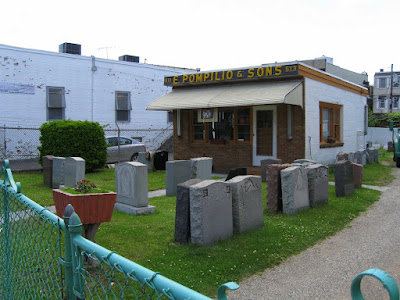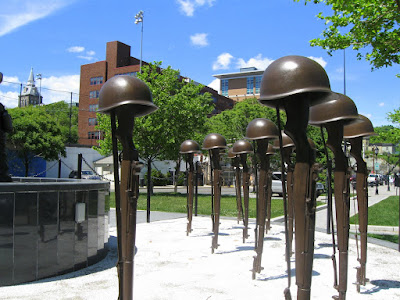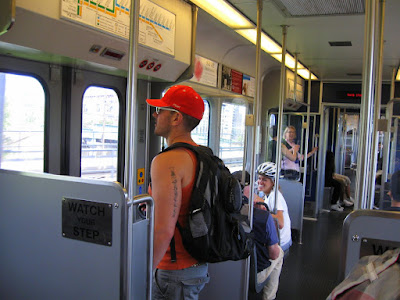
The cities just on the other side of the Hudson—especially Jersey City and Hoboken—are like a mirrored New York. Because Hudson County is surrounded on three sides by water (the Hudson, Kill Van Kull, Newark Bay, and the Hackensack River and Meadowlands marsh), it feels almost as separate from the rest of New Jersey as Manhattan does. It's densely packed, has a skyline that would do a Cleveland or a San Jose proud, and a big-city worthy transit network, with both a new
light-rail trolley and a subway (the
PATH) connecting to lower Manhattan and the Village. (Click
here for the interactive map of my run.) If you can ignore the arbitrary political boundaries, JC and Hoboken are almost as woven into the fabric of the city as Brooklyn and Queens across the opposite river.
But those boundaries
are hard to ignore. To the average NYC snob—and I'm afraid I'm one of those—the first stop on the PATH over the river might as well be the Moon or Montclair. It's still, you know,
New Jersey. Historically, there's evidence that even people who've live in Jersey City haven't had a

strong sense of their hometown as a distinctive, interesting place on the map. In her memoir
The Place You Love Is Gone, former Hoboken resident Melissa Holbrook Pierson writes: In the late fifties some researchers finally went around and asked people the most important thing of all: what the places they lived in felt like. Of the three cities studied, Boston, Los Angeles, and Hoboken's twin, Jersey City, the latter was found to be peculiarly poorly differentiated or "imageable," as the study has it. Its denizens' recall of its layout was far worse than those in the other two cities: "Many descriptions of the scene by established residents, young or old, were accompanied by the ghosts of what used to be there. Changes, such as those wrought by the freeway system, have left scars on the mental image."
Much more change was to come. They knocked down the
minor-league stadium where Jackie Robinson played the first integrated pro baseball game. A gated condo development stands in its place. Later, JC sprouted a slick new waterfront business district of glassy office towers and "luxury" apartments for the junior financial analysts and computer programmers who toil there. If you've been to Arlington's Pentagon City, the London Docklands, or Cambridge's Kendall Square, you've been to the JC waterfront. That's where my run started. After that, things quickly get more interesting—the city really won me over. There are blocks and blocks of Brooklynesque brownstones. The way you know you aren't in Cobble Hill is that the power and telephone lines are all overhead, and the neighborhoods are arranged around gorgeous Victorian square parks. Some buildings on the corner lots have street markers on their walls, like you see in Europe.
Then there's the former Jersey City Medical Center, a huge mass of Art Deco skyscrapers built with money from the Works Progress Administration. It was the special project of Mayor Frank Hague, a classic Democratic machine boss. According to this
New Jersey City U. site, the

Medical Center provided free care to residents who couldn't pay, which must have been most of them—the hospital cost $3 million a year to run, but supposedly billed patients just $15,000 in 1929. It went bankrupt in 1988. The buildings have since been converted into loft-style condos. I think you have the whole social history of the U.S. over the last 50 years right there...
My run also took me through Journal Square, JC's real commercial hub and the heart of its large Filipino and South Asian communities. On the other side of the Holland Tunnel entrance from Jersey City is Hoboken, the funny-sounding mile-square city of Frank Sinatra,
On the Waterfront,
Yo La Tengo, and
my favorite book when I was ten.
(It occurs to me now that jogging with a camera is a very Pinkwater kind of hobby.) Since the 1980s, Hoboken has gone from working-class 'burg of cold-water tenements ("The place they forgot to clean, forgot to love, forgot," writes Pierson) to affluent urban playground. A
rash of deadly arsons preceded a boom in development; it seems like it was an easy way to clear out low-rent tenants. Today, Hoboken is certainly beautiful—compact, walkable from end to end, packed with old brick townhouses—but it also makes Park Slope seem diverse and edgy. The city has a W hotel now. And a Five Guys. All it needs now is an NYU dorm. As Pierson writes about Hoboken's '80s transformation: "Hoboken was not changing so much as being eradicated. They kept only the name the same."
Like I said, it's really just another part of New York.
Now on to the pictures, most of them after the jump:
Starting at the waterfront
The Hudson Bergen Light Rail
This powerhouse once ran railroads
Entering the Van Vorst Park neighborhood
Jersey City Medical Center
JC skyline and a PATH train
Newkirk House: The marker says this was built in 1690.
I'm guessing the stucco came later.
Jersey City & Harismus Cemetery
A railroad trestle's remains
On the way into Harismus Cove
Check out the classic street markers
The empty trestle divides Harsmus Cove from
Hamilton Park
The first hotel outside of New York
NYC's golden door. Admission: $8
In Hoboken: Hudson County Homing Pigeon Club
A new playground on its own island
I don't think Frank played soccer.
Stairs up the cliff to Stevens Tech
Stevens Institute of Technology
View from the campus
Does this frat house really have its own
obeservatory?
The light rail station--where I stopped running
Elevator to Jersey City Heights
Looking toward lower Manhattan
I parked around here
somewhere...

 strong sense of their hometown as a distinctive, interesting place on the map. In her memoir The Place You Love Is Gone, former Hoboken resident Melissa Holbrook Pierson writes:
strong sense of their hometown as a distinctive, interesting place on the map. In her memoir The Place You Love Is Gone, former Hoboken resident Melissa Holbrook Pierson writes:  strong sense of their hometown as a distinctive, interesting place on the map. In her memoir The Place You Love Is Gone, former Hoboken resident Melissa Holbrook Pierson writes:
strong sense of their hometown as a distinctive, interesting place on the map. In her memoir The Place You Love Is Gone, former Hoboken resident Melissa Holbrook Pierson writes: 









































































Glad you made it over to the Garden State, Pat! Two things about Frank Hague that always make me smile:
ReplyDeletea) He had a desk in his office with a drawer--that opened toward the person sitting in front of him. He could push it out like a bank teller, or a late-night liquor store. It made the graft a little more discreet.
b) When he was tried for some sort of corruption charge, the prosecutor brought up Hague's mansion in Deal, NJ (an even more affluent resort enclave than it is now--and it's still pretty nice). Among other things, his beach house had 24kt gold bathroom fixtures. When asked how he could afford such a place on a mayor's salary of $7500 a year (or some such amount), Hague replied: "Well, I quit smoking. And the money I saved from that..."